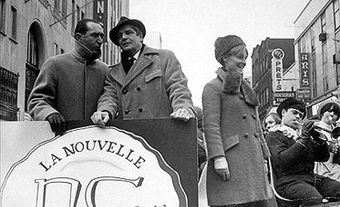Théâtre du Nouveau Monde
Théâtre du Nouveau Monde (TNM). In the wake of the unprecedented 1940s' theatre boom in Montréal dominated by Père Émile LEGAULT's les Compagnons de Saint Laurent, the founding of the Théâtre du Nouveau Monde in August 1951 marked the beginning of a genuine first-rate professional theatre in Québec. More than fifty years later, the TNM maintains its status as a great theatrical institution performing classics and works by local authors which will make up tomorrow's repertoire.
The young founders were Jean GASCON, who assumed the artistic direction, Georges Groulx, Guy Hoffmann, Éloi de GRANDMONT, Jean-Louis ROUX and Robert Gadouas - the only one who had not worked with les Compagnons. For the first six years, the TNM company performed at the Salle du Gesù, a hall at Collège Sainte-Marie where Gascon and Roux had studied. The inaugural performance of Molière's L'Avare was an outstanding hit in 1951, repeated in 1952. Rising stars such as Janine SUTTO, Denise PELLETIER, Monique MILLER, Antoinette Giroux and Huguette Oligny who would take part in a number of productions, soon joined the six founding members.
The company undertook several tours in Canada and abroad, playing in Paris in 1955 and 1958. Since 1952, Groulx and Gascon taught at the TNM training facility which preceeded founding of the National Theatre School (NTS) in 1960, and the Jeunes Comédiens, a company spawned from the NTS, came under the TNM's wing in 1966. In search of a hall, the TNM was a tenant at the Orpheum Theatre (1957 -1966), and Théâtre Port-Royal at Place des Arts (1967-1972). Major performances from the first period were epoch-making: Molière's L'École des femmes with Gascon and Geneviève BUJOLD; Musset's Lorenzaccio with Albert Millaire in 1965; and Brecht's Mère Courage with Denise Pelletier and Dyne Mousso in 1966. However, that year, disappointed by the lack of government support, Jean Gascon dramatically left the company and was replaced by Jean-Louis Roux.
The eventful era gave rise to daring performances from Dario Fo (Faut jeter la vieille, 1969) to Shakespeare (Hamlet). It included the then rather bold collective creation Gens de Noël, tremblez; Ionesco's Jeux de massacre and La Guerre, yes sir! by Roch Carrier, which caused a stir during the 1970 October Crisis. In 1972, the premiere of Claude GAUVREAU's provocative Les oranges sont vertes under Jean-Pierre Ronfard was controversial, but the TNM withstood the censure and experienced a turbulent but auspicious period. The acquisition of the Comédie-Canadienne hall (1972) at last provided a secure position. Relying on quality and a balance between new and established repertoire, Roux took a chance on programming that was in tune with his company. He featured the collective in La Neff des sorcières (1976); Rejoin Duchamp (HA! ha...,1978); Denise Boucher (Les fées ont soif, 1978); Jovette MARCHESSAULT (La Saga des poules mouillées, 1981), as well as Claudel, Racine, Genet, Federal, Jerry, Goldoni, TREMBLAY and others.
André Page's death the year after he was named artistic director (1981/82) passed the reins to Olivier Reichenbach. Reichenbach, in addition to his own productions (including Shaffer's Amadeus and Molière's Tartuffe), refocused on the classics and showcased a number of young directors: René Richard Cyr (Tremblay's Bonjour, là, bonjour), Robert LEPAGE, (Brecht's La Vie de Galilée), Yves Desgagnés (Dürrenmatt's Play Strindberg), André Brassard (Genet's Les Paravents, Beckett's En attendant Godot) and Lorraine Pintal ( DUCHARME's HA ha!... and Inès Pérée et Inat Tendu). Pintal took her turn at the helm in 1992.
The new director's infectious enthusiasm infused the TNM with vital energy. She attracted increasingly larger audiences, and had the hall renovated in 1997. Her own productions (Marcel Dubé's Les Beaux Dimanches, Racine's Andromaque, Normand Chaurette's Stabat Mater II etc.) rival those of Alice Ronfard (Euripide's Les Troyennes); Martine Beaulne (Goldoni's La Locandiera); Yves Desgagnés (Gorki's Les Bas-Fonds); Serge Denoncourt (Botho Strauss'Le Temps et la Chambre); Claude Poissant (Marivaux's Le Prince travesti), Brigitte Haentjens (Dacia Maraini's Marie Stuart) and Dominic Champagne (Don Quichotte and L'Odyssée). Moreover, the TNM again took up the tradition of touring in Québec and became more international, welcoming performances from France and exporting its own productions to Europe. There appears to be no end in sight.

 Share on Facebook
Share on Facebook Share on X
Share on X Share by Email
Share by Email Share on Google Classroom
Share on Google Classroom

